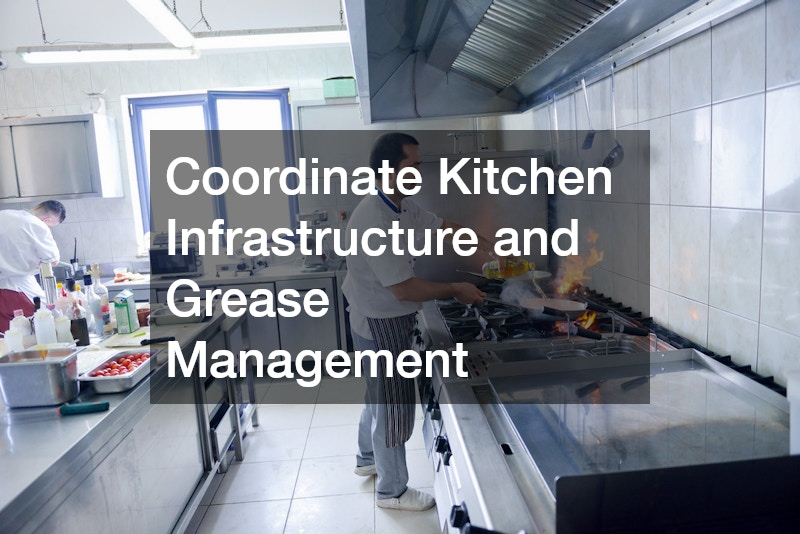Opening a restaurant is an exciting venture, but it can also be a complex and challenging process. Beyond crafting a unique menu and developing a brand identity, there’s the crucial step of building out your physical space. Whether you’re renovating an existing property or constructing a restaurant from the ground up, selecting the right contractors can make or break your project. A successful build-out requires precision, coordination, and trust in the professionals you hire.
Unfortunately, many restaurant owners underestimate the importance of vetting contractors carefully. Missteps in this area can lead to project delays, cost overruns, safety violations, and even legal issues. The process of assembling a reliable team of contractors isn’t just about finding the lowest bid; it’s about ensuring every part of your restaurant—structural, mechanical, aesthetic, and functional—is built to last.
This guide provides a step-by-step approach to choosing the right contractors for your restaurant build-out. You’ll learn how to define your project scope, vet professionals, coordinate specialty contractors, and maintain clear communication throughout construction. By the end, you’ll be equipped to make informed decisions that protect your investment and set your restaurant up for long-term success.
Define Your Vision and Budget Before Contacting Contractors

Before you even reach out to potential contractors, it’s essential to have a clear understanding of your restaurant’s vision, operational needs, and budget. A defined plan allows you to communicate expectations effectively and avoid costly surprises during construction.
Start by answering critical questions about your restaurant concept:
-
What type of cuisine and service style will you offer?
-
How many seats do you plan to have?
-
What ambiance or design aesthetic are you aiming for?
Next, consider your operational needs:
-
How much kitchen space is required for peak efficiency?
-
What storage, refrigeration, and prep areas will you need?
-
Do you plan to include a bar, outdoor seating, or private dining areas?
With your vision in place, create a realistic budget. Include not only construction costs but also equipment, permits, design fees, and contingencies. A well-documented budget helps contractors provide accurate quotes and prevents disagreements down the line.
Planning Tools to Keep Your Project on Track:
-
Develop a detailed project scope document outlining layout, materials, and design specifications.
-
Break your budget into categories: construction, equipment, permits, and contingency funds.
-
Schedule internal reviews of your plan to confirm feasibility before seeking bids.
Having a clear plan and budget is the foundation of a successful build-out and will guide your contractor selection process.
Verify Licensing, Experience, and Business Insurance Coverage

Hiring contractors without verifying their credentials is a common mistake that can have serious consequences. Start by checking licenses and certifications. Contractors working on commercial spaces often require specific licenses to handle plumbing, electrical, HVAC, and structural work. Ask for proof of licensing and ensure it’s current.
Equally important is confirming a contractor’s experience with restaurant projects. A contractor who regularly works on residential properties may lack the expertise required for commercial kitchens, ventilation, or fire safety systems. Request references and follow up with previous clients to understand their work quality, timelines, and professionalism.
Another critical aspect is ensuring that contractors carry the proper coverage through business insurance services. Liability insurance, workers’ compensation, and property damage policies protect your business if accidents occur or if work results in damage. Verify coverage limits and request copies of all insurance certificates before hiring.
To Ensure Comprehensive Protection:
-
Ask contractors to provide references from at least three restaurant or commercial projects.
-
Verify insurance with the provider directly, ensuring it’s adequate for commercial construction.
-
Include a clause in your contract requiring contractors to maintain insurance throughout the project.
Hiring a licensed, experienced, and insured contractor protects your business from liability and ensures professional-quality work.
Assess Site Preparation and Parking Lot Specialists
The success of your restaurant build-out depends on a solid foundation and proper site preparation. Before construction begins, evaluate contractors responsible for grading, drainage, and access points. Site prep ensures the structure is safe, functional, and durable, and it prevents long-term maintenance problems.
Parking and exterior areas are often overlooked but play a significant role in customer experience and operational efficiency. Properly maintained parking lots reduce liability risks and enhance curb appeal. Hiring contractors for parking lot maintenance, such as parking lot sealcoating services, can prolong pavement life, prevent water damage, and provide a safe environment for patrons.
Key Considerations for a Smooth Exterior:
-
Request examples of past projects showing site prep and parking solutions.
-
Confirm contractors follow local zoning and drainage regulations.
-
Schedule site inspections before and after work to verify quality and compliance.
Proper site preparation is a critical first step that sets the stage for every other phase of construction. Investing in expert infrastructure services now prevents costly repairs later.
Prioritize HVAC and Electrical Expertise for Reliable Operations
Mechanical, plumbing, and electrical systems form the backbone of your restaurant’s functionality. Improperly installed systems can lead to inefficient kitchens, safety hazards, and expensive retrofits. Choosing the right contractors for these specialties is crucial.
Commercial HVAC contractors are particularly important for restaurants. Kitchens generate heat, smoke, and grease-laden air, making ventilation systems critical. When evaluating HVAC contractors, ask about:
-
Experience with restaurant kitchens.
-
Energy-efficient system design.
-
Maintenance plans and emergency support.
Electrical systems are another area where expertise is non-negotiable. A commercial electrician ensures that wiring, circuits, and outlets meet the load requirements of high-powered kitchen equipment. Poorly installed electrical systems can cause fires or frequent outages, interrupting your business.
Tips for Securing Efficient HVAC and Electrical Systems:
-
Request detailed plans showing HVAC and electrical layouts.
-
Verify that all equipment loads and ventilation requirements are accounted for.
-
Ask for maintenance agreements or training for your staff on operating systems.
Investing in qualified mechanical and electrical contractors ensures operational reliability, efficiency, and compliance with local codes.
Integrate Fire Safety Systems Early
Restaurants are high-risk environments for fires, so it’s essential to integrate fire safety systems early in the build-out process. Kitchens, in particular, contain open flames, high-heat equipment, and grease buildup, which significantly increase fire hazards. Fire suppression systems are critical for protecting employees, customers, and property, and ensuring uninterrupted operations. Delaying fire safety planning can result in expensive retrofits, code violations, or even temporary closure during inspections.
Choosing a fire sprinkler company experienced in commercial kitchens is vital. A qualified contractor can assess your kitchen layout, identify high-risk zones, and design systems that meet local fire codes while integrating seamlessly with hoods, vents, and appliances. Experienced companies also provide guidance on routine maintenance and testing, which is crucial for ongoing compliance and insurance coverage. Early involvement not only prevents costly rework but also ensures your kitchen is fully compliant before opening, saving time and reducing liability risks.
Ensuring Compliance with Fire Safety Requirements:
-
Confirm the contractor is licensed and knowledgeable about local fire codes.
-
Schedule inspections during construction rather than waiting for the end of the project.
-
Coordinate fire suppression systems with kitchen design to avoid conflicts with hood placement and equipment.
Integrating fire safety from the beginning minimizes risk, protects your investment, and ensures compliance with regulations that could otherwise delay your opening. By partnering with a skilled fire sprinkler company, you can create a safer environment for employees and patrons while maintaining operational efficiency.
Protect Your Investment with Reliable Roofing Services
A restaurant’s roof and exterior play a critical role in protecting your investment and maintaining a comfortable environment for customers and staff. Poor roofing can lead to leaks, structural damage, mold growth, and energy inefficiency, all of which can disrupt operations and lead to costly repairs. Choosing commercial roofers with experience in restaurants or similar commercial buildings ensures that the installation is durable, code-compliant, and suited to the unique demands of a commercial kitchen and dining area.
When evaluating roofing contractors, it’s important to consider more than just cost. Pay attention to the materials used, as high-quality options can better withstand weather extremes, resist wear and tear, and provide long-term energy savings. Warranty options are equally important—ensure that both labor and materials are covered. Additionally, a proactive maintenance plan from the roofer can prevent small issues from escalating into major problems, keeping your restaurant safe and operational. Seasonal weather patterns, such as heavy rain, snow, or extreme heat, should inform your choice of materials and roofing techniques to maximize durability.
How to Choose Roofers That Safeguard Your Restaurant:
-
Ask for references and examples of completed commercial roofing projects.
-
Confirm the warranty covers both materials and labor.
-
Schedule regular inspections during construction to catch issues early.
A reliable roofing contractor ensures your restaurant is protected from the elements, reducing long-term maintenance costs.
Coordinate Kitchen Infrastructure and Grease Management

The kitchen is the heart of your restaurant, and meticulous planning is essential to ensure smooth operations from day one. Proper coordination between specialized contractors ensures that plumbing, ventilation, waste management, and utility systems all function seamlessly, minimizing disruptions during service and preventing costly retrofits later.
Grease trap services are a critical consideration for any commercial kitchen. Restaurants generate significant amounts of grease and food waste, which, if not properly filtered, can clog sewer lines and violate local health regulations. Hiring a contractor experienced in grease trap installation and ongoing maintenance ensures that your waste management system operates efficiently, remains compliant with environmental codes, and reduces the risk of expensive plumbing issues. Regular inspections and servicing of grease traps also prevent odors, backups, and potential fines.
Beyond plumbing and waste management, careful planning for kitchen equipment and supplies is essential. Partnering with suppliers of restaurant supplies early in the build-out process ensures that all necessary equipment—from prep tables and ovens to refrigeration and storage units—fits your kitchen layout and utility systems. This coordination prevents installation conflicts, allows for proper electrical and plumbing connections, and ensures that staff can work efficiently in a well-organized space. Additionally, reliable suppliers can provide guidance on durable, code-compliant equipment suited for your specific restaurant concept.
Optimizing Kitchen Layout and Waste Management:
-
Schedule coordination meetings between grease trap contractors and kitchen equipment suppliers.
-
Verify that all plumbing and drainage systems meet local codes.
-
Create a master plan that integrates equipment layout with utility infrastructure.
A coordinated approach ensures that your kitchen operates efficiently from day one, reducing maintenance issues and operational disruptions.
Boost Your Brand with Signage and Exterior Features
Your restaurant’s exterior is the first impression customers experience, making it a critical aspect of your overall brand identity. Well-designed signage and functional outdoor elements not only attract attention but also communicate professionalism and quality. Partnering with a sign printing company experienced in commercial and restaurant signage ensures your business complies with local codes while creating a cohesive, visually appealing look. Experienced providers can help with design, material selection, and installation, avoiding costly mistakes or delays due to permit issues.
Storefront awnings are another important component of a restaurant’s exterior. Beyond enhancing aesthetics, awnings provide shade and protection from rain, extending the usability of outdoor seating areas. They also contribute to energy efficiency by reducing direct sunlight and heat entering the building, which can lower cooling costs during warm months. Additionally, a well-designed awning reinforces your brand through colors, logos, or patterns that complement your overall design.
Maximizing Visibility and Curb Appeal:
-
Verify that the sign printing company can handle permits and code compliance.
-
Choose durable materials that withstand weather and UV exposure.
-
Coordinate awning installation with overall exterior design and outdoor seating plans.
Investing in quality signage and exterior elements supports branding, attracts customers, and enhances the overall dining experience.
Streamline Communication and Project Management
Even the most qualified contractors can cause delays if communication is poor. Establishing clear project management practices ensures that timelines, responsibilities, and expectations are understood by all parties.
Consider the role of a general contractor to coordinate specialty subcontractors. This central point of contact reduces miscommunication and ensures milestones are met. Collaborative tools, such as project management software or shared calendars, provide transparency and facilitate real-time updates.
Tips for Effective Communication and Coordination:
-
Hold weekly progress meetings with all contractors.
-
Document decisions and changes in writing to avoid misunderstandings.
-
Use a shared project timeline with defined milestones and deadlines.
Strong communication and project management practices minimize delays, prevent misunderstandings, and ensure the build-out stays on schedule and within budget.
Conduct Final Inspections and Establish Maintenance Plans
A successful restaurant build-out doesn’t end when construction is complete. Conducting thorough final inspections ensures that all work meets specifications and code requirements. A punch list identifies minor corrections before final payment.
It’s also essential to establish maintenance plans with your contractors. Routine inspections, service agreements, and equipment manuals help maintain your restaurant’s functionality and prevent costly breakdowns. Documenting warranties, maintenance schedules, and contact information ensures you have a reference if issues arise.
Maintaining Quality and Longevity Post-Construction:
-
Conduct a detailed walkthrough with each contractor, verifying work quality.
-
Create a comprehensive maintenance binder with warranties, manuals, and service contacts.
-
Schedule routine preventive maintenance to extend the life of systems and equipment.
A disciplined post-construction plan ensures your restaurant remains safe, functional, and efficient long after opening day.
Conclusion
Choosing the right contractors for your restaurant build-out is a complex but critical process. Every decision—from site preparation to kitchen design, roofing, fire safety, and exterior branding—has long-term implications for your business’s success. By defining your vision, verifying credentials, coordinating specialists, and maintaining clear communication, you can reduce risks, avoid costly mistakes, and create a space that functions beautifully from day one.
Building a restaurant is challenging, but with careful planning and the right professionals, it’s a manageable and rewarding endeavor. Investing the time and effort upfront to choose reliable contractors ensures that your restaurant not only opens on schedule but thrives for years to come.



